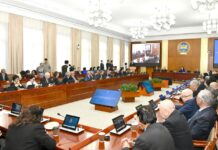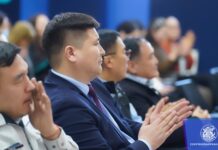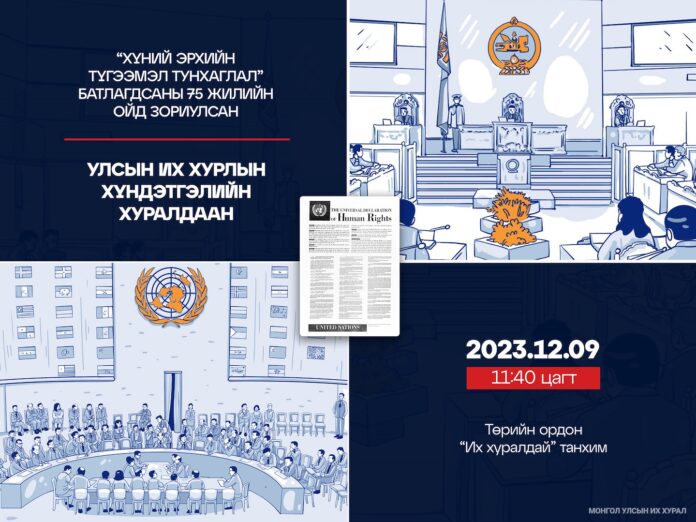Нэгдсэн Үндэстний Байгууллагын Ерөнхий Ассамблейн тогтоолоор батлагдсан “Хүний эрхийн түгээмэл тунхаглал”-ын 75 жилийн ой 2023 оны 12 дугаар сарын 10-ны өдөр тохиох юм.
Монгол Улсын Их Хурлын дарга Г.Занданшатар 2023 оны 11 дүгээр сарын 29-ний өдөр 196 тоот захирамж гарган, энэхүү ойд зориулсан Улсын Их Хурлын хүндэтгэлийн хуралдааныг 2023 оны 12 дугаар сарын 09-ний өдөр зарлан хуралдуулахаар боллоо.
Улсын Их Хурлын хүндэтгэлийн хуралдаан энэ долоо хоногийн бямба гарагт Төрийн ордны “Их Хуралдай” танхимд 11 цаг 40 минутад эхэлнэ.
ХҮНИЙ ЭРХИЙН ТҮГЭЭМЭЛ ТУНХАГЛАЛ
Нэгдсэн Үндэстний Байгууллагын Ерөнхий Ассамблейн 217/А/III/
тогтоолоор 1948 оны 12 дугаар сарын 10-ны өдөр баталж,
түүний бүх заалтыг дагаж мөрдөхийг гишүүн улсуудад уриалжээ.
УДИРТГАЛ
Хүн төрөлхтний ам бүлийн гишүүн бүхэнд угаас заяасан нэр төр болон тэдний адил тэгш, салшгүй эрхийг хүлээн зөвшөөрөх нь эрх чөлөө, шударга ёс, бүх нийтийн энх тайвны үндэс мөнийг иш үндэс болгон;
хүний эрхийг үл тоомсорлох, басамжлах нь зон олны ариун сэтгэлийг сэвтээн жигшээсэн балмад үйлдэлд хүргэж байсан бөгөөд хүмүүс үгээ хэлэх, итгэл үнэмшилтэй байх эрх чөлөөтэй түүнчлэн айх аюулгүй, гачигдах зовлонгүй дэлхий ертөнцийг бий болгох нь хүн ардын эрхэм дээд эрмэлзэл мөн хэмээн үзэж;
хүмүүс эзэрхэг засаглал, дарлалын эсрэг өөрийн эрхгүй эцсийн арга болгон зэвсэглэн босоход хүргэхгүйн тулд хүний эрхийг хуулиар хамгаалах нь нэн чухал гэдгийг анхааран;
улс түмний хооронд найрсаг харилцаа хөгжүүлэхэд тус дөхөм үзүүлэх нь нэн чухлыг харгалзан;
хүн үндсэн эрхтэй, хувь хүн нэр төр, үнэ цэнэтэй, эрэгтэй, эмэгтэйчүүд тэгш эрхтэй гэдэгт Нэгдсэн Үндэстний улс түмэн итгэл төгс байгаагаа дүрмээрээ нотлохын хамт, илүү эрх чөлөөтэй байдалд нийгмийн дэвшлийг урагшлуулах, амьдралын нөхцлийг сайжруулахад дөхөм үзүүлэхээр шийдвэрлэснийг харгалзан;
гишүүн улсууд Нэгдсэн Үндэстний Байгууллагатай хамтран хүний эрх, үндсэн эрх чөлөөг нийтээр хүндлэн сахихад тус дөхөм үзүүлэх үүрэг авсныг үндэслэн;
энэхүү үүргийг бүрэн биелүүлэхэд хүний эрх, эрх чөлөөг нийтээр нэг мөр ойлгох явдал нэн чухал ач холбогдолтойг харгалзан;
тийнхүү, үүний учир,
Ерөнхий Ассамблей,
Энэхүү хүний эрхийн түгээмэл тунхаглалыг дэлхийн бүх улс түмэн, бүх улс гүрэн хэрэгжүүлэхийг эрмэлзвэл зохих нийтлэг зорилт болгон дэвшүүлж, энэ зорилтын үүднээс хүн бүр, нийгмийн нэгж байгууллага бүхэн эл Тунхаглалыг байнга бодолцон гэгээрч боловсрох замаар хүний эрх, эрх чөлөөг хүндэтгэн сахихад дөхөм үзүүлэхийг эрмэлзэх ёстойг, түүнчлэн үндэсний болон олон улсын хэмжээний дэвшилтэт арга хэмжээ авах замаар эдгээр эрх, эрх чөлөөг Нэгдсэн Үндэстний гишүүн улсын ард түмэн, тэдгээр улсын эрх мэдлийн нутаг дэвсгэр дээр оршин суудаг ард түмний аль алинаар нь бүх нийтээр үр нөлөөтэй хүлээн зөвшөөрүүлж, дагаж мөрдөх явдлыг хангахад тус дөхөм үзүүлэхийг эрмэлзэх ёстойг зарлан тунхаглаж байна.
1 дүгээр зүйл
Хүн бүр төрөхөөсөө эрх чөлөөтэй, нэр төр, эрхийнхээ хувьд адил тэгш байна. Тэдэнд оюун ухаан, өрлөг сэтгэл заяасан бөгөөд өөр хоорондоо ахан дүүгийн ёсоор харилцах ёстой.
2 дугаар зүйл
Хүн бүр энэ Тунхаглалд заасан бүхий л эрх, эрх чөлөөг арьс үндэс, арьсны өнгө, хүйс, хэл, шашин шүтлэг, улс төрийн болон бусад үзэл бодол, үндэсний буюу нийгмийн гарал, эд хөрөнгө, язгуур угсаа болон бусад байдлын ялгааг эс харгалзан ямар ч гадуурхалгүйгээр эдлэх ёстой. Мөн түүнчлэн тухайн хүнийг харьяалдаг улс буюу нутаг дэвсгэрийн улс төр, эрх зүй болон олон улсын статус ямар ч байлаа гэсэн, тухайлбал, тусгаар тогтносон буюу асрамжинд байгаа, өөрөө эс удирдах зэрэг бүрэн эрхт байдал нь ямар ч байдлаар хязгаарлагдмал байсан тэр нь ялгаварлах үндэс болох ёсгүй.
3 дугаар зүйл
Хүн бүр амьд явах, эрх чөлөөтэй байх, халдашгүй дархан байх эрхтэй.
4 дүгээр зүйл
Хэнийг ч боолчлох буюу бусдын эрхшээлд байлгах ёсгүй. Аливаа төрлийн боолчлол болон боолын худалдааг хориглоно.
5 дугаар зүйл
Хэнд ч эрүү шүүлт тулган эсхүл хэнтэй ч хэрцгийгээр, хүний ёсноос гадуур буюу нэр төрийг нь доромжлон харьцах, шийтгэх ёсгүй.
6 дугаар зүйл
Хүн бүр хаана ч байсан эрх зүйн чадвартай байх эрхээ хүлээн зөвшөөрүүлэх эрхтэй.
7 дугаар зүйл
Хүн бүр хуулийн өмнө адил тэгш бөгөөд ямар ч алагчилалгүйгээр хуулиар адилхан хамгаалуулах эрхтэй. Хүн бүр энэхүү Тунхаглалд харшлах аливаа алагчилалаас болон тийнхүү алагчилахыг өдөөсөн турхиралтаас адилхан хамгаалуулах эрхтэй.
8 дугаар зүйл
Үндсэн хууль болон бусад хуулиар олгосон үндсэн эрх нь зөрчигдвөл хүн бүр эрх мэдэл бүхий үндэсний шүүхээр эрхээ бүрэн сэргээн тогтоолгох эрхтэй.
9 дүгээр зүйл
Хэнийг ч дур мэдэн баривчлах, саатуулах буюу хөөн зайлуулах ёсгүй.
10 дугаар зүйл
Хүн бүр тулгасан аливаа эрүүгийн ял болон эрх үүргээ тодорхойлуулахдаа хараат бус, тал хардаггүй шүүхээр бүрэн адил тэгш үндсэн дээр нээлттэй, шударгаар шүүлгэх эрхтэй.
11 дүгээр зүйл
1. Гэмт хэрэгт буруутгагдаж буй хэн боловч өмгөөлөх бүх боломжоор хангагдсан нээлттэй шүүх хурлаар гэм буруутайг нь хуулийн дагуу тогтоох хүртэл гэм буруугүй гэж тооцогдох эрхтэй.
2. Тухайн үед үндэсний буюу олон улсын хуулийн дагуу гэмт хэрэгт эс тооцож байсан аливаа үйлдэл буюу эс үйлдлийг үндэслэж, хэнийг ч гэмт хэрэгт яллан шийтгэх ёсгүй. Түүнчлэн гэмт хэрэг гарсан тэр үед ногдуулж болох байснаас илүү хүнд ял тохоож болохгүй.
12 дугаар зүйл
Хэний ч хувийн болон гэр бүлийн амьдралд хөндлөнгөөс дур мэдэн оролцох, орон байрны халдашгүй байдал, захидал харилцааных нь нууц болон нэр төр, алдар хүндэд нь халдах ёсгүй. Тийм оролцоо халдлагын эсрэг хэн ч бай хуулиар хамгаалуулах эрхтэй.
13 дугаар зүйл
1. Хэн боловч улсынхаа дотор чөлөөтэй зорчих, оршин суух газраа чөлөөтэй сонгох эрхтэй.
2. Хэн боловч аливаа улс орныг, түүний дотроо эх орноо орхин явах, эх орондоо эргэж очих эрхтэй.
14 дүгээр зүйл
1. Хэн боловч мөрдөлт мөшгөлтөөс зугтаж, өөр улсад орогнох боломжийг эрэлхийлэх болон орогнох эрхтэй.
2. Улс төрийн бус гэмт хэргийн улмаас буюу Нэгдсэн Үндэстний Байгууллагын зорилго, зарчимд харш хэрэг үйлдсэний улмаас зайлшгүй мөрдөгдөж буй тохиолдолд дээрх эрхийг эдлэж үл болно.
15 дугаар зүйл
1. Хүн бүр иргэний харьяалалтай байх эрхтэй.
2. Аливаа хүний иргэний харьяалал болон харьяаллаа өөрчлөх эрхийг дур мэдэн цуцлах ёсгүй.
16 дугаар зүйл
1. Насанд хүрсэн эрэгтэй, эмэгтэй хүмүүс арьс үндэс, яс үндэс, шашин шүтлэгтэй холбогдсон аливаа хязгаарлалтгүйгээр гэрлэх, өрх тусгаарлах эрхтэй. Тэд гэрлэхдээ, гэрлэсний дараа болон гэрлэлтээ цуцлуулах үед тэгш эрх эдлэнэ.
2. Нөхөр, эхнэр болох хоёр хүн чөлөөтэй, харилцан бүрэн зөвшөөрсөн нөхцөлд гэрлэж болно.
3. Гэр бүл бол нийгмийн жам ёсны үндсэн нэгж мөн бөгөөд нийгэм, төрөөр хамгаалуулах эрхтэй.
17 дугаар зүйл
1. Хүн бүр эд хөрөнгийг ганцаараа буюу бусадтай хамтарч өмчлөх эрхтэй.
2. Хэний ч өмч хөрөнгийг дураар хураан авч болохгүй.
18 дугаар зүйл
Хүн бүр чөлөөтэй бодож сэтгэх, шашин шүтэх, эс шүтэх эрхтэй. Энэхүү эрхэнд шашин буюу шүтлэгээ өөрчлөх эрх чөлөө, бие даан буюу бусадтай хамтран нийтийн өмнө болон хувийн журмаар хичээл заах, хурал мөргөл хийх, шашны хийгээд зан үйлийн ёслол үйлдэх зэргээр шашин буюу шүтлэгээ номлох эрх чөлөө багтана.
19 дүгээр зүйл
Хүн бүр өөрийн үзэл бодолтой байх, түүнийгээ чөлөөтэй илэрхийлэх эрхтэй; энэхүү эрхэнд үзэл бодлоо ямар ч хорио саадгүй баримтлах эрх чөлөө, үзэл санаа, мэдээллийг улсын хилийн заагаар үл хязгаарлан аливаа арга замаар эрж сурвалжлах, хүлээж авах, түгээн дэлгэрүүлэх эрх чөлөө багтана.
20 дугаар зүйл
1. Хүн бүр чөлөөтэй, тайван хуран цуглах, эвлэлдэн нэгдэх эрхтэй.
2. Хэнийг ч аливаа эвлэл холбоонд албадан оруулах ёсгүй.
21 дүгээр зүйл
1. Хүн бүр улсаа удирдахад шууд буюу чөлөөтэй сонгосон төлөөлөгчдөөрөө уламжлан оролцох эрхтэй.
2. Хүн бүр улсдаа төрийн алба хаших тэгш эрхтэй.
3. Ард түмний хүсэл зориг бол засгийн эрх мэдлийн үндэс байх ёстой. Энэ хүсэл зориг нь сонгуулийн бүх нийтийн тэгш эрхийн үндсэн дээр саналыг нууцаар хураах буюу саналаа чөлөөтэй гаргах явдлыг хангахуйц өөр адил чанартай хэлбэрийг ашиглах замаар явуулж байвал зохих тогтмол, хуурамч бус сонгуулиар илрэлээ олно.
22 дугаар зүйл
Хүн бүр нийгмийн гишүүний хувьд нийгмийн хангамж эдлэх, түүнчлэн нэр төрөө хадгалах, биеэ боловсруулж хөгжүүлэхэд зайлшгүй шаардлагатай эдийн засаг, нийгэм, соёлын эрхээ улс бүрийн бүтэц, нөөц бололцоотой уялдуулан үндэсний хүч чармайлт хийгээд олон улсын хамтын ажиллагааны замаар хэрэгжүүлэх эрхтэй.
23 дугаар зүйл
1. Хүн бүр хөдөлмөрлөх, ажлаа чөлөөтэй сонгох, хөдөлмөрийн шударга, аятай нөхцлөөр хангуулах, ажилгүйдлээс хамгаалуулах эрхтэй.
2. Хүн бүр ямар ч алагчилалгүйгээр адил хэмжээний хөдөлмөрт адил хэмжээний шан хөлс авах эрхтэй.
3. Ажил хөдөлмөр эрхэлж байгаа хэн боловч хувийн болон ам бүлийнхээ ахуй амьжиргааг хүний зэрэгтэй авч явахад хүрэлцэхүйц бөгөөд зайлшгүй тохиолдолд нийгмийн хангамжийн эх үүсвэрээр нэмэн арвижуулсан, хийсэндээ таарсан, хүртээмжтэй шан хөлс авах эрхтэй.
4. Хүн бүр эрх ашгаа хамгаалах зорилгоор үйлдвэрчний эвлэл байгуулах буюу үйлдвэрчний эвлэлд нэгдэх эрхтэй.
24 дүгээр зүйл
Хүн бүр ажлын цагаа зохистойгоор хязгаарлуулах, цалинтай ээлжийн амралт эдлэх эрхийг оролцуулан амрах, зав чөлөөтэй байх эрхтэй.
25 дугаар зүйл
1. Хүн бүр хоол хүнс, хувцас хунар, орон байр, эмчилгээ сувилгаа, нийгэм ахуйн зайлшгүй шаардлагатай үйлчилгээг оролцуулаад өөрийн болон ам бүлийнхээ эрүүл мэнд, аж амьдралыг тэтгэхэд хүрэлцэхүйц амьжиргаатай байх эрхтэй. Ажилгүйдэх, өвчлөх, тахир дутуу болох, бэлэвсрэх, өтлөх, эсхүл өөрөөс үл хамаарах бусад шалтгаанаар амь зуулгагүй болох нөхцөлд тэтгэмж авах эрхтэй.
2. Эх нялхас онцгой асрамж, туслалцаа авах эрхтэй. Баталгаатай гэр бүлээс гарсан буюу бутач гэдгээс үл хамааран бүх хүүхэд нийгмээс адилхан хамгаалалт эдлэх ёстой.
26 дугаар зүйл
1. Хүн бүр сурч боловсрох эрхтэй. Наад зах нь анхан шатны болон ерөнхий боловсрол үнэ төлбөргүй байвал зохино. Анхан шатны боловсролыг заавал эзэмшүүлэх ёстой. Техникийн болон тусгай мэргэжлийн боловсрол нийтэд хүртээлтэй байх ёстой. Авъяас чадвартай нь уялдан хүн бүрт дээд боловсрол эзэмших боломж адилхан хүртээлтэй олгох ёстой.
2. Боловсрол нь бие хүнийг өв тэгш хөгжүүлэх, хүний эрх, үндсэн эрх чөлөөг улам бүр хүндэтгэдэг болоход чиглэх ёстой. Боловсрол нь аливаа улс түмэн, янз бүрийн арьстан хийгээд шашны бүлгүүд бие биеэ харилцан ойлгох, хүлцэн тэвчих, эвсэн найрамдах, мөн түүнчлэн Нэгдсэн Үндэстний Байгууллагаас энх тайвныг сахиулах талаар явуулж буй үйл ажиллагаанд дөхөм үзүүлэх ёстой.
3. Хүүхэддээ олгох боловсролын чиглэлийг сонгоход эцэг эх давуу эрх эдлэнэ.
27 дугаар зүйл
1. Хүн бүр нийгмийнхээ соёлын амьдралд чөлөөтэй оролцох, урлагийн цэнгэлийг эдлэх, шинжлэх ухааны дэвшилд оролцож үр шимийг нь хүртэх эрхтэй.
2. Хүн бүр өөрийн туурвисан шинжлэх ухаан, утга зохиол, уран сайхны бүтээлийн материаллаг болон ёс суртахууны эрх ашгаа хамгаалуулах эрхтэй.
28 дугаар зүйл
Хүн бүр энэхүү Тунхаглалд заасан эрх, эрх чөлөөг бүрэн эдлэж болохуйц нийгмийн болон олон улсын дэг журамд аж төрөх эрхтэй.
29 дүгээр зүйл
1. Хүн бүр нийгмийнхээ өмнө тодорхой үүрэг хүлээх бөгөөд гагцхүү нийгэм л бие хүний чөлөөтэй, өв тэгш хөгжлийг хангана.
2. Хүн бүр эрх, эрх чөлөөгөө эдлэхдээ гагцхүү бусдын эрх, эрх чөлөөг зохих ёсоор хүлээн зөвшөөрч хүндлэх, мөн ардчилсан нийгмийн ёс суртахууны шударга шаардлага, нийгмийн хэв журам, ерөнхий сайн сайхан байдлыг хангах үүднээс хуульчлан тогтоосноос өөр хязгаарлалтад өртөгдөх ёсгүй.
3. Эдгээр эрх, эрх чөлөөг хэрэгжүүлэхдээ Нэгдсэн Үндэстний Байгууллагын зорилго, зарчимтай хэрхэвч зөрчилдүүлж болохгүй.
30 дугаар зүйл
Энэхүү Тунхаглалын ямар ч зүйлийг аль нэг улс, бүлэг буюу бие хүний зүгээс энд тунхагласан эрх, эрх чөлөөг устгахад чиглэсэн аливаа үйл ажиллагаа явуулах буюу тийм үйлдэл хийх эрх олгож байгаа мэтээр мушгин тайлбарлаж болохгүй.
UNIVERSAL DECLARATION OF HUMAN RIGHTS
The Universal Declaration of Human Rights (UDHR) is a milestone document in the history of human rights. Drafted by representatives with different legal and cultural backgrounds from all regions of the world, the Declaration was proclaimed by the United Nations General Assembly in Paris on 10 December 1948 (General Assembly resolution 217 A) as a common standard of achievements for all peoples and all nations. It sets out, for the first time, fundamental human rights to be universally protected and it has been translated into over 500 languages. The UDHR is widely recognized as having inspired, and paved the way for, the adoption of more than seventy human rights treaties, applied today on a permanent basis at global and regional levels (all containing references to it in their preambles).
Preamble
Whereas recognition of the inherent dignity and of the equal and inalienable rights of all members of the human family is the foundation of freedom, justice and peace in the world,
Whereas disregard and contempt for human rights have resulted in barbarous acts which have outraged the conscience of mankind, and the advent of a world in which human beings shall enjoy freedom of speech and belief and freedom from fear and want has been proclaimed as the highest aspiration of the common people,
Whereas it is essential, if man is not to be compelled to have recourse, as a last resort, to rebellion against tyranny and oppression, that human rights should be protected by the rule of law,
Whereas it is essential to promote the development of friendly relations between nations,
Whereas the peoples of the United Nations have in the Charter reaffirmed their faith in fundamental human rights, in the dignity and worth of the human person and in the equal rights of men and women and have determined to promote social progress and better standards of life in larger freedom,
Whereas Member States have pledged themselves to achieve, in co-operation with the United Nations, the promotion of universal respect for and observance of human rights and fundamental freedoms,
Whereas a common understanding of these rights and freedoms is of the greatest importance for the full realization of this pledge,
Now, therefore,
The General Assembly,
Proclaims this Universal Declaration of Human Rights as a common standard of achievement for all peoples and all nations, to the end that every individual and every organ of society, keeping this Declaration constantly in mind, shall strive by teaching and education to promote respect for these rights and freedoms and by progressive measures, national and international, to secure their universal and effective recognition and observance, both among the peoples of Member States themselves and among the peoples of territories under their jurisdiction.
Article 1
All human beings are born free and equal in dignity and rights. They are endowed with reason and conscience and should act towards one another in a spirit of brotherhood.
Article 2
Everyone is entitled to all the rights and freedoms set forth in this Declaration, without distinction of any kind, such as race, colour, sex, language, religion, political or other opinion, national or social origin, property, birth or other status. Furthermore, no distinction shall be made on the basis of the political, jurisdictional or international status of the country or territory to which a person belongs, whether it be independent, trust, non-self-governing or under any other limitation of sovereignty.
Article 3
Everyone has the right to life, liberty and security of person.
Article 4
No one shall be held in slavery or servitude; slavery and the slave trade shall be prohibited in all their forms.
Article 5
No one shall be subjected to torture or to cruel, inhuman or degrading treatment or punishment.
Article 6
Everyone has the right to recognition everywhere as a person before the law.
Article 7
All are equal before the law and are entitled without any discrimination to equal protection of the law. All are entitled to equal protection against any discrimination in violation of this Declaration and against any incitement to such discrimination.
Article 8
Everyone has the right to an effective remedy by the competent national tribunals for acts violating the fundamental rights granted him by the constitution or by law.
Article 9
No one shall be subjected to arbitrary arrest, detention or exile.
Article 10
Everyone is entitled in full equality to a fair and public hearing by an independent and impartial tribunal, in the determination of his rights and obligations and of any criminal charge against him.
Article 11
1.Everyone charged with a penal offence has the right to be presumed innocent until proved guilty according to law in a public trial at which he has had all the guarantees necessary for his defence.
2.No one shall be held guilty of any penal offence on account of any act or omission which did not constitute a penal offence, under national or international law, at the time when it was committed. Nor shall a heavier penalty be imposed than the one that was applicable at the time the penal offence was committed.
Article 12
No one shall be subjected to arbitrary interference with his privacy, family, home or correspondence, nor to attacks upon his honour and reputation. Everyone has the right to the protection of the law against such interference or attacks.
Article 13
1.Everyone has the right to freedom of movement and residence within the borders of each state.
2.Everyone has the right to leave any country, including his own, and to return to his country.
Article 14
1.Everyone has the right to seek and to enjoy in other countries asylum from persecution.
2.This right may not be invoked in the case of prosecutions genuinely arising from non-political crimes or from acts contrary to the purposes and principles of the United Nations.
Article 15
1.Everyone has the right to a nationality.
2.No one shall be arbitrarily deprived of his nationality nor denied the right to change his nationality.
Article 16
1.Men and women of full age, without any limitation due to race, nationality or religion, have the right to marry and to found a family. They are entitled to equal rights as to marriage, during marriage and at its dissolution.
2.Marriage shall be entered into only with the free and full consent of the intending spouses.
3.The family is the natural and fundamental group unit of society and is entitled to protection by society and the State.
Article 17
1.Everyone has the right to own property alone as well as in association with others.
2.No one shall be arbitrarily deprived of his property.
Article 18
Everyone has the right to freedom of thought, conscience and religion; this right includes freedom to change his religion or belief, and freedom, either alone or in community with others and in public or private, to manifest his religion or belief in teaching, practice, worship and observance.
Article 19
Everyone has the right to freedom of opinion and expression; this right includes freedom to hold opinions without interference and to seek, receive and impart information and ideas through any media and regardless of frontiers.
Article 20
1.Everyone has the right to freedom of peaceful assembly and association.
2.No one may be compelled to belong to an association.
Article 21
1.Everyone has the right to take part in the government of his country, directly or through freely chosen representatives.
2.Everyone has the right of equal access to public service in his country.
3.The will of the people shall be the basis of the authority of government; this will shall be expressed in periodic and genuine elections which shall be by universal and equal suffrage and shall be held by secret vote or by equivalent free voting procedures.
Article 22
Everyone, as a member of society, has the right to social security and is entitled to realization, through national effort and international co-operation and in accordance with the organization and resources of each State, of the economic, social and cultural rights indispensable for his dignity and the free development of his personality.
Article 23
1.Everyone has the right to work, to free choice of employment, to just and favourable conditions of work and to protection against unemployment.
2.Everyone, without any discrimination, has the right to equal pay for equal work.
3.Everyone who works has the right to just and favourable remuneration ensuring for himself and his family an existence worthy of human dignity, and supplemented, if necessary, by other means of social protection.
4.Everyone has the right to form and to join trade unions for the protection of his interests.
Article 24
Everyone has the right to rest and leisure, including reasonable limitation of working hours and periodic holidays with pay.
Article 25
1.Everyone has the right to a standard of living adequate for the health and well-being of himself and of his family, including food, clothing, housing and medical care and necessary social services, and the right to security in the event of unemployment, sickness, disability, widowhood, old age or other lack of livelihood in circumstances beyond his control.
2.Motherhood and childhood are entitled to special care and assistance. All children, whether born in or out of wedlock, shall enjoy the same social protection.
Article 26
1.Everyone has the right to education. Education shall be free, at least in the elementary and fundamental stages. Elementary education shall be compulsory. Technical and professional education shall be made generally available and higher education shall be equally accessible to all on the basis of merit.
2.Education shall be directed to the full development of the human personality and to the strengthening of respect for human rights and fundamental freedoms. It shall promote understanding, tolerance and friendship among all nations, racial or religious groups, and shall further the activities of the United Nations for the maintenance of peace.
3.Parents have a prior right to choose the kind of education that shall be given to their children.
Article 27
1.Everyone has the right freely to participate in the cultural life of the community, to enjoy the arts and to share in scientific advancement and its benefits.
2.Everyone has the right to the protection of the moral and material interests resulting from any scientific, literary or artistic production of which he is the author.
Article 28
Everyone is entitled to a social and international order in which the rights and freedoms set forth in this Declaration can be fully realized.
Article 29
1.Everyone has duties to the community in which alone the free and full development of his personality is possible.
2.In the exercise of his rights and freedoms, everyone shall be subject only to such limitations as are determined by law solely for the purpose of securing due recognition and respect for the rights and freedoms of others and of meeting the just requirements of morality, public order and the general welfare in a democratic society.
3.These rights and freedoms may in no case be exercised contrary to the purposes and principles of the United Nations.
Article 30
Nothing in this Declaration may be interpreted as implying for any State, group or person any right to engage in any activity or to perform any act aimed at the destruction of any of the rights and freedoms set forth herein.






